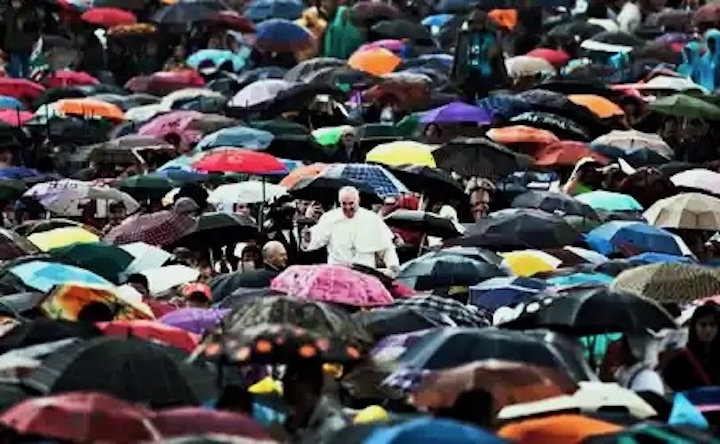My worry about Laudate Deum (“all you praise God”), the recent Apostolic Exhortation “to all people of good will on the climate crisis,” is that because it represents an incursion into the domain of the laity, it implicitly converts a matter of prudence, which always involves an awareness of trade-offs, into a matter of faith.
I take my doctrine on the laity from Vatican II. In Lumen gentium, bishops are accorded the role of defining doctrine in faith and morals. Their specific competence in this task “extends as far as the deposit of Revelation extends.” (n. 25) The laity in contrast are tasked with applying these principles to the world: “laity, by their very vocation, seek the kingdom of God by engaging in temporal affairs and by ordering them according to the plan of God.” (n. 31) “By divine institution Holy Church is ordered and governed with a wonderful diversity,” the Council Fathers exclaim. (n. 32)
One would think that this genuine diversity, in the matter of the climate, would imply a division of labor: the bishops set down general principles drawn from the deposit of faith; and the laity, using their specific competencies, consider how most prudently to apply them. Lumen gentium imagines teamwork in the Church, in outline working like this.
But in Laudate Deum the Catholic laity do not make an appearance. What one finds instead is teamwork between the Holy See and an association of scientists, the “Intergovernmental Panel on Climate Change” (IPCC), with a short-circuiting of the laity. (Perhaps teamwork is not propitious in the face of emergencies.)
At the same time, the relatively cautious statements of that quasi-scientific body are converted into certainties. Consider the contrasts. The Exhortation at one place asserts this:
we know that every time the global temperature increases by 0.5° C, the intensity and frequency of great rains and floods increase in some areas and severe droughts in others, extreme heat waves in some places and heavy snowfall in others.
“We know.” What I know, I cannot be wrong about. It makes no sense to say, “I know that my keys are on the nightstand, but I may be wrong.” Rather, one should say, “I believe.” Thus, “we know” implies certainty and the exclusion of doubt.
So on what basis do we “know” this? The Exhortation cites the 2021 IPPC report (B.2.2), which reads:
every additional 0.5° C of global warming causes clearly discernible increases in the intensity and frequency of hot extremes, including heatwaves (very likely), and heavy precipitation (high confidence), as well as agricultural and ecological droughts in some regions (high confidence). Discernible changes in intensity and frequency of meteorological droughts, with more regions showing increases than decreases, are seen in some regions for every additional 0.5°C of global warming (medium confidence). Increases in frequency and intensity of hydrological droughts become larger with increasing global warming in some regions (medium confidence). There will be an increasing occurrence of some extreme events unprecedented in the observational record with additional global warming, even at 1.5°C of global warming. Projected percentage changes in frequency are larger for rarer events (high confidence).
In IPCC lingo, “very likely” means a probability of at least 90 percent based on their models. The number has no validity beyond the validity of their models. We do not know the probability that their models are correct. While “medium confidence” is a qualitative term meaning some (but not all) experts agree, and there is moderately strong evidence in favor. Thus, we see that a measured statement in the IPCC report, which certainly leaves room for doubt, is converted by Laudate Deum into a certainty. And the IPCC paragraph says nothing about snow, and it says that heat waves might be more frequent, not more extreme.
Quibbles, these last, perhaps – but why cite an authority to support you, if it doesn’t support you?

The tone of impending crisis in Laudate Deum is driven by an anticipation of tipping points, that is, approaching boundaries of irreversible loss. It declares without any qualification that if global temperatures “should rise above 2 degrees, the icecaps of Greenland and a large part of Antarctica will melt completely, with immensely grave consequences for everyone.”
It again cites the IPCC, this time their 2023 report (B.3.2). In the report one indeed finds the claim that “At sustained warming levels between 2°C and 3°C, the Greenland and West Antarctic ice sheets will be lost almost completely and irreversibly over multiple millennia.” That is, irreversible, if lost over multiple millennia. But the IPCC qualifies and says there is only “limited evidence” to support even this claim. “Limited evidence” is their lowest level of support.
One can go on and on. Laudate Deum consistently turns qualified statements about the world into certainties appropriate only for articles of faith. Unlike a truly scientific discussion, it does not review counter-objections or conflicting evidence. Apparently, in the face of an emergency, one difficulty would indeed make one doubt. Doubts must be avoided, like vaccine hesitancy.
At the same time it speaks derisively of anyone who would disagree with its assertions. Such people are attempting “to deny, conceal, gloss over or relativize the issue.” Scientists, too, who disagree only “seek to deny the evidence.” (n. 13)
That global warming would be a net harm is also taken for granted: “it is indubitable that the impact of climate change will increasingly prejudice the lives and families of many persons.” Perhaps, but what is the net effect? And are proposed remedies, all things considered, prudent? Who can say? We face an emergency; apparently trade-offs are excluded.
In a concluding section on “Spiritual Motivations,” the Exhortation cites a book by a particularly disturbed feminist and anti-natalist professor, Donna Haraway, as the source of the idea of “contact zones” where diverse living things meet. Ah, but it was Mary Louise Pratt who famously came up with that concept, not Donna Haraway. But why worry about footnotes? Or sources?
__________















